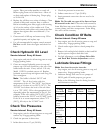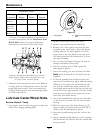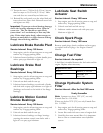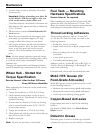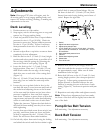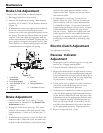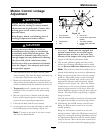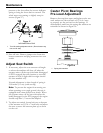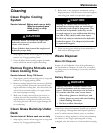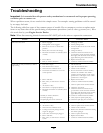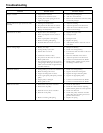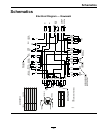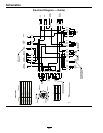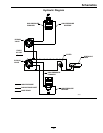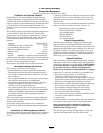
Maintenance
Cleaning
Clean Engine Cooling
System
Service Interval: Before each use or daily
(May be required more
often in dry or dirty
conditions.)
CAUTION
Excessive debris can cause the engine and
hydraulic system to overheat which can
create a re hazard.
Clean all debris from around the engine and
hydraulic pumps daily.
1. Stop engine, wait for all moving parts to stop, and
remove key. Engage parking brake.
2. Clean all debris from rotating engine air intake
screen and from around engine shrouding.
Remove Engine Shrouds and
Clean Cooling Fins
Service Interval: Every 100 hours
1. Stop engine, wait for all moving parts to stop, and
remove key. Engage parking brake.
2. Remove cooling shroud clean-out covers (Kohler)
or cooling shrouds (Kawasaki Air-cooled) from
engine and clean cooling ns. Also clean dust, dirt
and oil from external surfaces of engine which
can cause improper cooling.
3. Make sure cooling shroud clean-out covers or
cooling shrouds are reinstalled. Operating the
engine without cooling shroud clean-out covers
or cooling shrouds will cause engine damage due
to overheating.
Clean Grass Build-Up Under
Deck
Service Interval: Before each use or daily
1. Stop engine, wait for all moving parts to stop, and
remove key. Engage parking brake.
2. Raise deck to the transport (maximum cutting
height) position. Lift the front of unit and support
unit using jack stands or equivalent support.
CAUTION
Raising the mower deck for service or
maintenance relying solely on mechanical
or hydraulic jacks could be dangerous. The
mechanical or hydraulic jacks may not be
enough support or may malfunction allowing
the unit to fall, which could cause injury.
Do Not rely solely on mechanical or hydraulic
jacks for support. Use adequate jack stands
or equivalent support.
3. Clean out any grass build-up from underside of
deck and in discharge chute.
Waste Disposal
Motor Oil Disposal
Engine oil and hydraulic oil are both pollutants to
the environment. Dispose of used oil at a certied
recycling center or according to your state and local
regulations.
Battery Disposal
DANGER
Battery electrolyte contains sulfuric acid,
which is poisonous and can cause severe
burns. Swallowing electrolyte can be fatal or
if it touches skin can cause severe burns.
• Wear safety glasses to shield eyes, and
rubber gloves to protect skin and clothing
when handling electrolyte.
• Do Not swallow electrolyte.
Federal law states that batteries should not be placed
in the garbage. Management and disposal practices
must be within relevant federal, state, or local laws.
If a battery is being replaced or if the unit containing
the battery is no longer operating and is being
scrapped, take the battery to a local certied recycling
37



